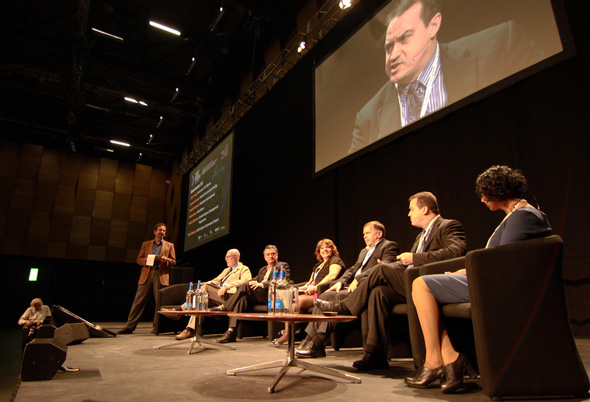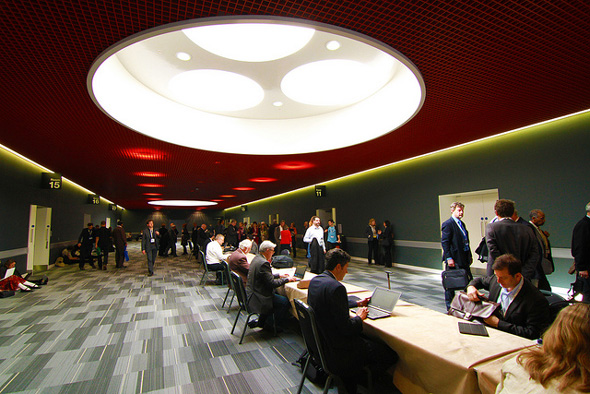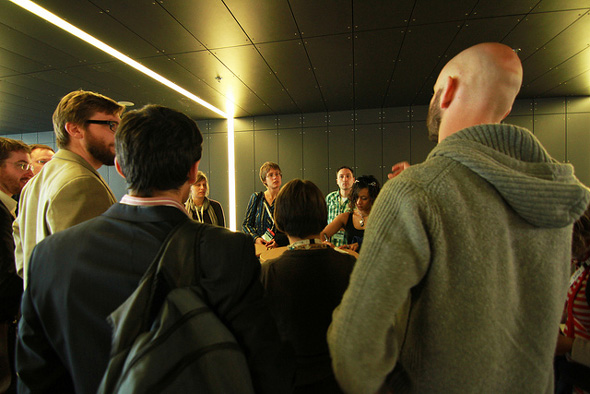The ECSP delegation to the 2012
Planet Under Pressure conference in London kept a keen eye on discussions of population and demographic dynamics during plenary and breakout sessions. And while the European frame of these topics resembles a much more open discussion of population pressures, presentations repeatedly looked at a broad suite of development challenges, avoiding the urge to elevate one challenge over another.
Out of the hundreds of panels during the week, we counted four that explicitly addressed population (one was hidden in the “Climate Compatible Development” program).
We polled a few participants on their take-aways from the conference, including Bishnu Upretti of the Swiss National Centre of Competence in Research (above). Upretti’s focus is on South Asia, where water and food insecurity, poverty, population, and political tensions – all of which fit under the conference’s broad “global change” heading – are major issues. He came away with an overall positive impression, particularly in the conference’s potential as input for the upcoming Rio+20 UN Conference on Sustainable Development.
But some were not so optimistic about the overall global picture. “It’s all been a bit of a failure really,” said Chris Rapley of University College London on environmental change (below). “Humanity has proved itself incapable either of believing it, or even…getting a grip on the impact that it’s having on the planet.”
Though upbeat about progress in the natural sciences, Rapley argued that without better defining and communicating the consequences, threats, and risks at play, other political and economic concerns will continue to trump the climate and environment concerns.
“We can talk…in very general terms, but to both people and politicians and business people – all three parts of society that have to work together…really coherently to solve this problem – that sort of rather vague ‘gosh it looks a bit gloomy down there but we can’t tell you precisely what’s going to happen’ doesn’t cut the ice,” he lamented.
A Bridge Too Far?
At a conference like this, where topics are wildly diverse and overwhelming, distilling an easy narrative is difficult. Planet Under Pressure was a dizzying collection of natural scientists, inventors, students, journalists, professors, social scientists, and more. Collecting a group like this can shed light on dynamic and innovative work, not to mention foster collaboration on a tangible scale. However, finding grand solutions to the sheer number of challenges, or pressures, placed on the planet isn’t easy.
Yes, the planet is under pressure and this means the international community needs to talk about sustainability, climate change, and overall development in order to ensure a healthy planet for future generations, but nuanced discussion of difficult topics like population dynamics and human health are still a periphery part of the conversation.
The Planet Under Pressure Declaration – the collaborative statement intended to reflect the key messages emerging from the conference – leaves a lot to be desired in this regard. Sarah Fisher, a research and communications officer at the Population and Sustainability Network, suggested text for the declaration that included mention of population dynamics, including growth, urbanization, aging, and migration, in its framing of sustainable development, as well as explicit reference to the importance of human health and wellbeing.
But the final draft of the declaration was largely devoid of these issues, instead focusing more narrowly on environmental degradation and straightforward natural resource management.
For those looking to bridge the gap between the social and natural sciences, then, the focus shifts to the upcoming Rio+20 summit. The specter of the Earth Summit was tangible throughout the conference. From panels to informal discussions, the message was clear: there’s a lot more to be done.
For full population-related coverage from the conference, see our “Planet 2012 tag”. You can also join the conversation on Twitter (#Planet2012). Pictures from the event are available on our Facebook and Flickr pages – enjoy a few below.
Photo and Video Credit: Sean Peoples/Wilson Center.

 Photo and Video Credit: Sean Peoples/Wilson Center.
Photo and Video Credit: Sean Peoples/Wilson Center.
 A Publication of the Stimson Center.
A Publication of the Stimson Center.






